反意疑问句_精品(3)
反义疑问句
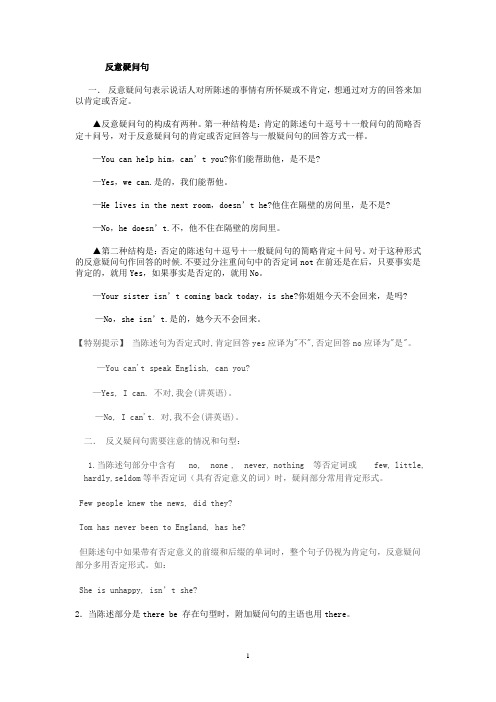
反意疑问句一.反意疑问句表示说话人对所陈述的事情有所怀疑或不肯定,想通过对方的回答来加以肯定或否定。
▲反意疑问句的构成有两种。
第一种结构是:肯定的陈述句+逗号+一般问句的简略否定+问号,对于反意疑问句的肯定或否定回答与一般疑问句的回答方式一样。
—You can help him,can’t you?你们能帮助他,是不是?—Yes,we can.是的,我们能帮他。
—He lives in the next room,doesn’t he?他住在隔壁的房间里,是不是?—No,he doesn’t.不,他不住在隔壁的房间里。
▲第二种结构是:否定的陈述句+逗号+一般疑问句的简略肯定+问号。
对于这种形式的反意疑问句作回答的时候.不要过分注重问句中的否定词not在前还是在后,只要事实是肯定的,就用Yes,如果事实是否定的,就用No。
—Your sister isn’t coming back today,is she?你姐姐今天不会回来,是吗?—No,she isn’t.是的,她今天不会回来。
【特别提示】当陈述句为否定式时,肯定回答yes应译为"不",否定回答no应译为"是"。
—You can't speak English, can you?—Yes, I can. 不对,我会(讲英语)。
—No, I can't. 对,我不会(讲英语)。
二.反义疑问句需要注意的情况和句型:1.当陈述句部分中含有 no, none , never, nothing 等否定词或 few, little, hardly,seldom等半否定词(具有否定意义的词)时,疑问部分常用肯定形式。
Few people knew the news, did they?Tom has never been to England, has he?但陈述句中如果带有否定意义的前缀和后缀的单词时,整个句子仍视为肯定句,反意疑问部分多用否定形式。
反义疑问句例句20个
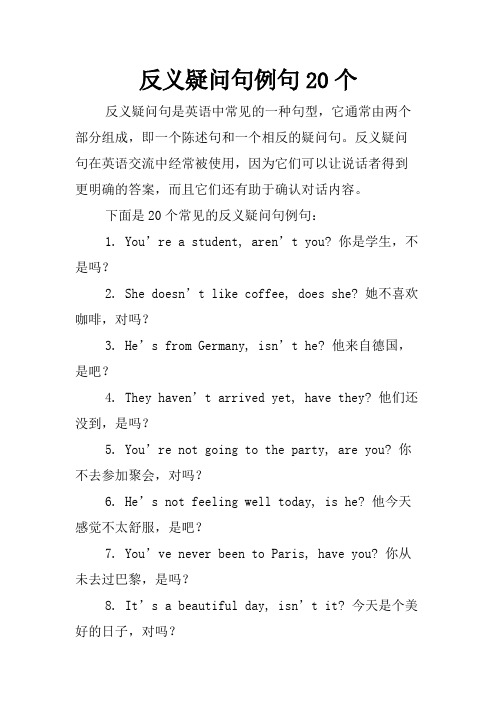
反义疑问句例句20个反义疑问句是英语中常见的一种句型,它通常由两个部分组成,即一个陈述句和一个相反的疑问句。
反义疑问句在英语交流中经常被使用,因为它们可以让说话者得到更明确的答案,而且它们还有助于确认对话内容。
下面是20个常见的反义疑问句例句:1. You’re a student, aren’t you? 你是学生,不是吗?2. She doesn’t like coffee, does she? 她不喜欢咖啡,对吗?3. He’s from Germany, isn’t he? 他来自德国,是吧?4. They haven’t arrived yet, have they? 他们还没到,是吗?5. You’re not going to the party, are you? 你不去参加聚会,对吗?6. He’s not feeling well today, is he? 他今天感觉不太舒服,是吧?7. You’ve never been to Paris, have you? 你从未去过巴黎,是吗?8. It’s a beautiful day, isn’t it? 今天是个美好的日子,对吗?9. He can’t swim, can he? 他不会游泳,对吗?10. She doesn’t like pizza, does she? 她不喜欢披萨,对吗?11. You’re not afraid of heights, are you? 你不怕高,对吗?12. They won’t be able to attend the meeting, will they? 他们不能参加会议,对吗?13. They’re leaving tomorrow, aren’t they? 他们明天要走了,对吗?14. He’s never been skiing, has he? 他从未滑过雪,对吗?15. She’s not going to the concert, is she? 她不去音乐会,对吗?16. You’re not worried about the exam, are you? 你不担心考试吧,对吗?17. He didn’t eat breakfast this morning, did he? 他今天早上没吃早餐,对吗?18. They’r e not going to the beach, are they? 他们不去海边,对吗?19. You’ve already seen the movie, haven’t you? 你已经看过这部电影了,对吗?20. He’s not coming to the party, is he? 他不来参加聚会,对吗?在使用反义疑问句时,需要注意的是,它们并不总是表示对话者的不确定或疑虑。
反义疑问句的用法归纳及习题
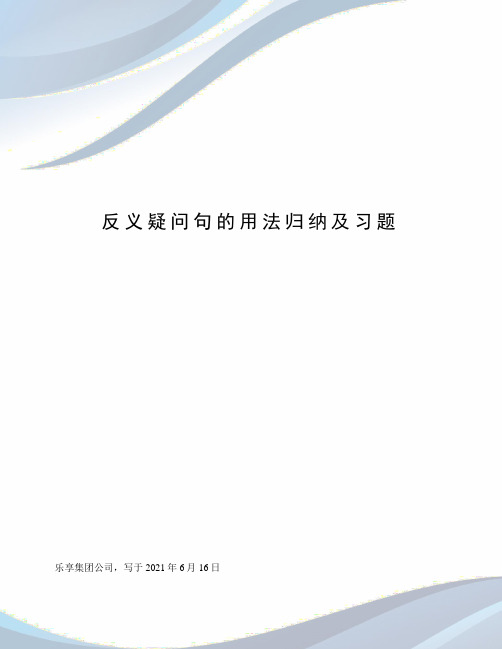
反义疑问句的用法归纳及习题乐享集团公司,写于2021年6月16日反意疑问句反意疑问句一概念:反意疑问句是由陈述句和附在其后的附加疑问句组成;其中附加疑问句是对陈述句所说的事实或观点提出疑问,起证实作用,一般用于证实说话者所说的事实或观点; 二要点注意:1、反意疑问句前后两部分谓语应是:“肯定陈述+否定疑问”或“否定陈述+肯定疑问”;2、简略问句如果是否定式:not应与be,do,will等系动词、助动词、情态动词缩写;3、简略问句的主语不用名词,应用人称代词;4、陈述部分含“too...to”时,是否定句;三用法:1 陈述部分I am时,疑问部分要用 aren't I.I'm as tall as your sister,aren't I我和你姐姐一样高,对吗2 陈述部分用 no, nothing, nobody, never, few, little, seldom, rarely,hardly等否定含义的词时,疑问部分用肯定含义;如: The old man made no answer, did heJim is never late for school, is he3 陈述部分有情态动词have to +v. had to + v.,疑问部分常用don't +主语didn't +主语;We have to get there at eight tomorrow, don't weused to,疑问部分用didn't +主语或 usedn't +主语;He used to take pictures there, didn't he / usedn't hehad better最好 + v. 疑问句部分用hadn't youYou'd better read it by yourself, hadn't you4 陈述部分有would rather宁可、宁愿 +v.,疑问部分多用 wouldn't +主语;He would rather read it ten times than recite it, wouldn't he5 陈述部分有You'd like to +v. 疑问部分用wouldn't +主语;You'd like to go with me, wouldn't you6 陈述部分主语是指示代词或不定代词everything, that, nothing, this, 疑问部分主语用it;Everything is ready, isn't it陈述部分主语是不定代词everybody, anyone, somebody, nobody, no one等,疑问部分常用复数they,有时也用单数he.Everyone knows the answer, don't they doesn’t heNobody knows about it, do they does he7 含有宾语从句的反义疑问句A.主语是第一人称I don't think he is bright, is heWe believe she can do it better, can't sheB. 如果主语不是第一人称则疑问部分与主句相对应构成反意疑问句He thought they were wrong, didn't he 不能说weren't they当陈述部分带有宾语从句时,疑问部分的主语应与主句的主语保持一致;He said that he would come to my birthday party, didn’t he 他说他会来参加我的生日聚会,是吗但当主句是:I think, I believe, I suppose, I except, I imagine等结构时,疑问部分的主语和谓语动词应与宾语从句的主语和谓语保持一致;I don’t believe he will succeed, will he 我不相信他会成功,是吗He doesn’t believe he will succeed, does he 他不相信他会成功,是吗8 省去主语的祈使句的反意疑问句,Don't do that again, will youGo with me, will you / won't you否定祈使句 + will you肯定祈使句 + will / won’t youLet's 开头的祈使句,后用shall we或用shan't we而Let us 开头的祈使句,后用will you或won't youLet's go and listen to the music, shall we或用shan't weLet us wait for you in the reading-room, will you 或won't you9 陈述部分是"there be"结构的,疑问部分用there;There is something wrong with your watch, isn't thereThere will not be any trouble, will there11如果陈述句部分的谓语含有带否定前缀dis-, un-, im-或否定后缀-less的词dislike, discourage,be unfair/ untrue/ unable, etc.,仍按肯定句处理,其反问部分一般用否定式;It’s unfair, isn’t it 不公平,是吗You dislike it, don’t you 你不喜欢它,是吗The patient is unable to move round, isn’t he 这个病人不能到处走,是吗10、陈述部分含有must的反义疑问句:当must作“必须”讲时,其翻译疑问部分用needn’t;当含有mustn’t不允许,禁止时,其反意疑问部分用must/ may;You must go now, needn’t you 你必须走,是吗You mustn’t smoke here, must/may you 你不可以在这里吸烟,对吗11、感叹句中,疑问部分用be +主语;What beautiful flowers, aren’t they 多漂亮的花呀,不是吗16、带情态动词dare或need的反义疑问句,疑问部分常用 need dare +主语;We need not do it again, need we 我们不需要重做,是吗He dare not say so, dare he 他不敢如此说,是吗当dare, need 为实义动词时,疑问部分用助动词do + 主语;例如:She doesn’t dare to go home alone, does she 她不敢独自回家,是吗四、反义疑问句的回答:1、一个句子前后保持一致,要么肯定到底,要么否定到底,不能出现Yes, Idon’t和No, I do的形式;You don’t go to school on Sunday, do you 肯定回答:Yes, I do.否定回答:No, I don’t.2、反义疑问句的回答是根据实际情况来回答的;不用看汉语如何翻译,只看所提到的事情是否发生;如果发生了,就用肯定回答,否则用否定回答;1. Don’t forget to give Polly some food and change her water, _______A. shall weB. will youC. won’t youD. do you2. There is little juice in the glass, _________A. is thereB. isn’t thereC. is it3. ---He’s seldom late for school, ___________ ---No. He is used to going to school early.A. isn’t heB. has heC. hasn’t heD. is hebus is always late, _________ ---Sure, it is.A. is not itB. isn’t itC. isn’t the busD. doesn’t it’re new here, ________ ----Yes, I’m from Dujiangyan. I came here last week.A. do youB. don’t youC. are youD. aren’t you6. You used to be outgoing,A. do youB. don’t youC. didn’t youD. did you7. He has never watched such an important match , _____ he A. hasn't B. has C. is D. isn'thave to work at once,______ they A. have B. haven't C. do D. don't9. She often feels tired,______ she A. doesn't B. does C. is D. isn't10. Let's take a short rest, ______ A. do we B. aren't we C. will you D. shall we11. Hundreds of people lost their lives in the accident,_______ they A. don't B. didn't C. do D. did12. ---Lily didn't come to school, did she ---____. She was ill in bed.A. No, she didB. Yes, she did.C. No, she didn't.D. Yes, she didn'tisn't a teacher, is she---_____. She works in a hospital.A. No, she isB. Yes, she is.C. No, she isn't.D. Yes, she isn'tlooks like Lucy,_______ A. is Lily B. isn't she C. does Lilly D. doesn't sheoften has lunch at school,_____A. doesn't TomB. doesn't heC. does TomD. doesn't hehardly hurt himself in the accident___________A. doesn’t heB. didn’t heC. did heD. does he2. Let’s search the Internet for some information about famous people,______A. will youB. won’t youC. shall we3.Eric’s never seen a three-D movie at the cinema,_______A.hasn’t he B.has he C.isn’t he D.is hedidn’t go to the lecture this morning, did he----______. Though he was not feeling very well.A. No, he didn’t.B. Yes, he did.C. No, he did.D. Yes, he didn’t.5.—He’s already back to Australia, _________— _________. He is on a visit to Shanghai.A. isn’t he; NoB. hasn’t he; YesC. i sn’t he; YesD. hasn’t he; No6.—She doesn’t like geography, does she—___________ .A. Yes, she doesB. Yes, she doesn’tC. No, she does7. He’s flown to Hainan for a holiday, _______ heA. isn’tB. hasn’tC. wasn’t8. ---- Let’s go skating,_______ ---- OK. Let’s go.A. do youB. don’t youC. will youD. shall we9. ---There is little milk in the milk bag, ________ there ---OK. I’ll get you a new bag.A. isB. isn’tC. aren’tD. are10. Bob, you watched the fashion show last night, ________A. weren’t youB. didn’t youC. haven’t youD. won’t you11. ---Are you going to the picnic with us tonight---Yes. ---You won’t be late, ________12. There is no important information in the newspaper, _______A. isn’t thereB. is itC. is there13. There are two libraries in this city, _______A. aren’t thereB. aren’t theyC. are two14. Mom, my grandfather goes for a walk after supper every day, _______A. does heB. is heC. doesn’t heD. isn’t he15. Liu Qian has made “magic” a hot word, _______ heA. doesn’tB. didn’tC. hasn’tD. isn’taren’t a professional athlete, are you---______. I am just a football fan.A. Yes, I amB. No, I’m notC. Of courseD. Sometimes17. ---Millions of people know about Susan Boyle now, _______----_______, she becomes well-known because of her success on Britain’s Got Talent.A. do they; NoB. do they; YesC. don’t they; NoD. don’t they; Yes18. He’s fed the dog and the cat, _______A. doesn’t heB. isn’t heC. wasn’t heD. hasn’t he19. John, clean your room, _______A. will youB. shall weC. don’t youD. doesn’t he20. I don’t think she has gone to Beijing, _______A. has sheB. hasn’t sheC. do ID. don’t I●一、完成下列反意疑问句, 每空一词;● 1. We must go at once, _____________________● 2. My uncle used to smoke, _____________________● 3. She is a music lover, _____________________● 4. You need to have a good dictionary, _____________________● 5. Let us do the jobs ourselves, _____________________● 6. There used to be an old stone bridge across the river, _____________________ ●7. Please turn down the radio, _____________________●8. There were few people there, _____________________●9. If anybody comes here, he will be welcome, _____________________●10. I am late for the meeting, _____________________二、把下列各句改成反意疑问句;1. I think he is right.____________________________________________________________2. I don’t think you’re seriously ill.____________________________________________________________3. I don’t suppose they will be back soon.____________________________________________________________4. Don’t do such a job.____________________________________________________________5. You needn’t do that when your daughter is here.____________________________________________________________6. What you need is more practice.____________________________________________________________7. He says that it is really true.____________________________________________________________8. He dared to ask the teacher many questions.____________________________________________________________9. That is an honest girl____________________________________________________________10. Tom hasn’t much time to spare.____________________________________________________________三、单项选择;1. An elephant is strong, _______ itA. doesn’tB. doesC. isn’tD. is2. You are new here, _______youA. aren’tB. areC. doD. don’t3. Martin is good at fishing, _______A. is heB. does heC. isn’t heD. doesn’t he4. The little dog is lovely, _______A. isn’t itB. is itC. isn’t the dogD. is the dog。
常用反义疑问句

(1)everyone,no one,nobody ,everybody, anybody, anyone, somebody, someone, nobody, none, neither 时等时,后面的疑问句应表示为:Everyone is in the classroom, aren't they? (基本不用单数,但也可用he)Nobody will go, will they?(2)everything,anything,nothing,something时,附加疑问句中主语一般用it 不用they(3)this,that,或those,these时,附加疑问句中主语用it和they.A当陈述部分有never,seldom, hardly,few,little,barely, scarcely, nothing, little, not, no, no one, nobody, nothing, none, neither 等否定意义的词时,后面的反意疑问句则为肯定形式:There are few apples in the basket, are there?He can hardly swim, can he?They seldom come late, do they?B当陈述部分含有否定意思的词是unhappy,dislike,unfriendly等含有否定词缀的派生词,也就是有un-前缀、-less后缀等含有词缀而意思否定的词,当做肯定句处理,疑问部分要用否定形式。
如:He looks unhappy,doesn't he?他看上去不高兴,不是吗?The girl dislikes history,doesn't she?这女孩不喜欢历史,不是吗?表示主语主观意愿的词含有think, believe, suppose, imagine, expect等动词后接宾语从句构成的主从复合句在构成反意疑问句时,视情况不同有两种不同的构成方式。
英语反义疑问句讲解及练习题(3)
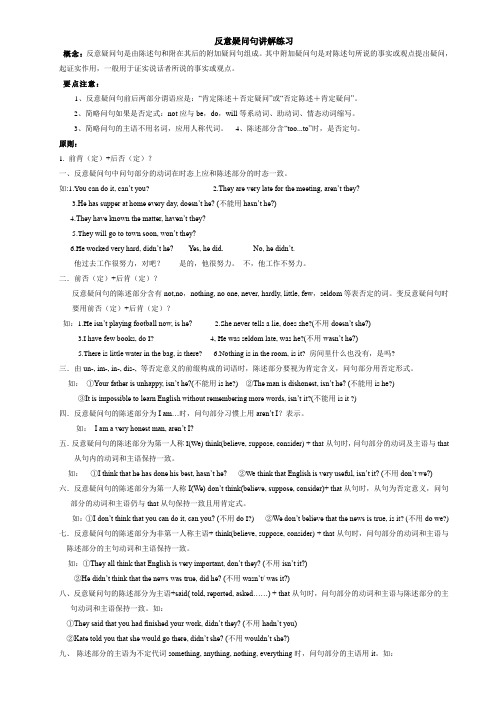
反意疑问句讲解练习概念:反意疑问句是由陈述句和附在其后的附加疑问句组成。
其中附加疑问句是对陈述句所说的事实或观点提出疑问,起证实作用,一般用于证实说话者所说的事实或观点。
要点注意:1、反意疑问句前后两部分谓语应是:“肯定陈述+否定疑问”或“否定陈述+肯定疑问”。
2、简略问句如果是否定式:not应与be,do,will等系动词、助动词、情态动词缩写。
3、简略问句的主语不用名词,应用人称代词。
4、陈述部分含“too...to”时,是否定句。
原则:1. 前肯(定)+后否(定)?一、反意疑问句中问句部分的动词在时态上应和陈述部分的时态一致。
如:1.You can do it, can’t you? 2.They are very late for the meeting, aren’t they?3.He has supper at home every day, doesn’t he? (不能用hasn’t he?)4.They have known the matter, haven’t they?5.They will go to town soon, won’t they?6.He worked very hard, did n’t he? Yes, he did. No, he didn’t.他过去工作很努力,对吧?是的,他很努力。
不,他工作不努力。
二.前否(定)+后肯(定)?反意疑问句的陈述部分含有not,no,nothing, no one, never, hardly, little, few,seldom等表否定的词。
变反意疑问句时要用前否(定)+后肯(定)?如:1.He i sn’t playing football now, is he? 2.She never tells a lie, does she?(不用doesn’t she?)3.I have few books, do I? 4, He was seldom late, was he?(不用wasn’t he?)5.There is little water in the bag, is there?6.Nothing is in the room, is it? 房间里什么也没有,是吗?三.由un-, im-, in-, dis-, 等否定意义的前缀构成的词语时,陈述部分要视为肯定含义,问句部分用否定形式。
反义疑问句

conversation n.交谈;谈话hold/have a conversation with 和……谈话Children quickly get bored by adult conversation.aloud adv.大声的;出生地aloud是相对于默读而言,声音不一定很大。
常与read,say等动词连用。
loudly表示有目的的提高音量以便让人听见。
常指声音高且喧闹、不悦耳等patient adj.有耐心的n.病人be patient with/to 对……有耐心be patient of sth忍耐某事Are you patient enough to teach me how to send email?discover v.发现;发觉dis(否定前缀)+cover(覆盖)发现We discover this beach while we were sailing around the island.secret n.秘密;秘诀adj.秘密的;保密的通常用作单数名词,其前加定冠词the。
keep a secret 保密the secret to ……的秘诀in secret 秘密地,暗地里let out a secret泄露机密tell sb a secret 告诉某人一个秘密Your secret is safe with me.look up(再词典、参考书中或通过电脑)查阅;抬头看We I called him,he looked up from his paper he was writing.I look up the word in several dictionaries.repeat v.重复;重做repeat本身已包含“重、又、再”的含义,故不可与“again”连用。
Please repeat what I’ve just told you.increase v.增加;增长increase by 增加了increase to 增加到Try to increase thenumber of your words.they’ve increased the price by 50﹪.speed n.速度at the speed of 以……的速度with all speed 以全速Extreme care is always needed when flying at high speed.born v.出生adj.天生的be born with 天生具有be born in 出生于Her borther was born with blind.connect v.(使)连接;与……有联系connect with 把……和……连接起来connect to 把……连接到……Connect the speakers to the CD players.knowledge n.知识;学问knowledge是不可数名词,但有时可加不定冠词,意为“对……有某种程度的了解”;knowledge 不能做learn的宾语,只能说get some knowledge。
反义疑问句讲解与练习

反义疑问句讲解与练习一、含be(is, are, was, were)动词的反意疑问句(1)句型1:主语+ be+其它,isn’t(aren’t, wasn’t, weren’t)+ 主语?句型2:主语+ be not+其它,is(are, was, were) + 主语?① You are from America, aren’t you? Yes, I am. No, I’m not.② It isn’t very cold today, is it? Yes, it is. No,it isn’t.(2)注意:There be句型例:There is an old picture on the wall, isn’t there?二、带行为动词反意疑问句(不含be和情态动词)句型1:主语+动词+其他,do/did/does + not +主语?句型2:主语+did/does/do+not +动词原形+其他,did/do/does+其他?例:You often watch TV in the evening, don’t you? Yes, I do. No, I don’t.三、含有情态动词的反意疑问句,反义疑问句中的动词使用情态动词。
例:The students must study hard, mustn’t they? Yes, they must. No, they needn’t.注意:You must go home now, needn’t you? Yes, I must. No, I needn’t.★注意:There be句型的一般将来时① There will be a basketball match tomorrow, won’t there?Yes, there will. No, there won’t.② There won’t be too much pollution in the future, will there?Yes, there will. No, there won’t.四、反义疑问句的回答:答语要和实际情况相符合,遵循“实事求是”的原则。
反义疑问句练习 (3)

1. He is waiting in line , _ __ ?2. She has been learning English,____ ?3. We can't take the books out,____ ?4. He has to go home on foot, ________ ?5. You haven't had your lunch, ____ ?6. Maria has few friends in China, _____?7. They dislike the book,____ ? 8. You’ve never s een such an exciting movie, ____?9. Let’s go for a walk after supper, ____? 10. Don’t talk too loud i n public,______?11. Let us clean the blackboard, ____? 12. Have a nice day, ________?1. He is waiting in line , _ __ ?2. She has been learning English,____ ?3. We can't take the books out,____ ?4. He has to go home on foot, ________ ?5. You haven't had your lunch, ____ ?6. Maria has few friends in China, _____?7. They dislike the book,____ ? 8. You’ve never s een such an exciting movie, ____?9. Let’s go for a walk after supper, ____? 10. Don’t talk too loud i n public,______?11. Let us clean the blackboard, ____? 12. Have a nice day, ________?1. He is waiting in line , _ __ ?2. She has been learning English,____ ?3. We can't take the books out,____ ?4. He has to go home on foot, ________ ?5. You haven't had your lunch, ____ ?6. Maria has few friends in China, _____?7. They dislike the book,____ ? 8. You’ve never s een such an exciting movie, ____?9. Let’s go for a walk after supper, ____? 10. Don’t talk too loud i n public,______?11. Let us clean the blackboard, ____? 12. Have a nice day, ________?1. He is waiting in line , _ __ ?2. She has been learning English,____ ?3. We can't take the books out,____ ?4. He has to go home on foot, ________ ?5. You haven't had your lunch, ____ ?6. Maria has few friends in China, _____?7. They dislike the book,____ ? 8. You’ve never s een such an exciting movie, ____?9. Let’s go for a walk after supper, ____? 10. Don’t talk too loud i n public,______?11. Let us clean the blackboard, ____? 12. Have a nice day, ________?1. He is waiting in line , _ __ ?2. She has been learning English,____ ?3. We can't take the books out,____ ?4. He has to go home on foot, ________ ?5. You haven't had your lunch, ____ ?6. Maria has few friends in China, _____?7. They dislike the book,____ ? 8. You’ve never s een such an exciting movie, ____?9. Let’s go for a walk after supper, ____? 10. Don’t talk too loud i n public,______?11. Let us clean the blackboard, ____? 12. Have a nice day, ________1. He is waiting in line _ __ ?2. She has been learning English,____ ?3. We can't take the books out,____ ?4. He has to go home on foot, ________ ?5. You haven't had your lunch, ____ ?6. Maria has few friends in China, _____?7. They dislike the book,____ ? 8. You’ve never s een such an exciting movie, ____?9. Let’s go for a walk after supper, ____? 10. Don’t talk too loud i n public,______?11. Let us clean the blackboard, ____? 12. Have a nice day, ________?。
最新初中英语反义疑问句的用法归纳25654

反义疑问句(1)反意疑问句要点简述反意疑问句又叫附加疑问句,是在陈述句后,对陈述句所叙述的事实提出的疑问。
其基本结构有两种:一是“肯定陈述句+简略否定问句”;二是“否定陈述句+简略肯定问句”。
反意疑问句后一部分的主谓与前一部分的主谓要保持人称及助动词等方面的一致。
这种疑问句的回答要根据事实,肯定的用“Yes, …”。
否定的用“No, …”。
如:It looks like rain, doesn’t it?He doesn’t need to work so late, does he?(2)学习反意疑问句,特别要注意的问题1)陈述部分的主语是this, that时,疑问部分的主语多用it;陈述部分的主语是these, those时,疑问部分的主语多用they。
如:This is a dictionary, isn’t it?Those are shelves, aren’t they?2)陈述句如果是there be结构时,疑问句部分仍用there。
如:There once was a man named Saint Nicholas, wasn’t there?3)在英语口语中,“I am +表语结构”,后面的反意疑问句多用aren’t I来体现。
如:I am very interested in learning English, aren’t I?4)陈述句的主语是动词不定式,动词的-ing形式或从句时,疑问部分的主语多用it来体现。
如:Taking care of our environment is very important, isn’t it?What he said is right, isn’t it?5)陈述句中含有not, no, hardly, neither, never, few, little, too …to等否定词或具有否定意义的词时,疑问部分常用肯定形式。
如:Few people knew the news, did they?Tom has never been to England , has he?但陈述句中如果带有否定意义的前缀和后缀的单词时,整个句子仍视为肯定句,反意疑问部分多用否定形式。
(完整版)反义疑问句讲解及答案

反义疑问句一.句型解释反义疑问句(The Disjunctive Question):即附加疑问句。
它表示提问人的看法,没有把握,需要对方证实。
反义疑问句由两部分组成:前一部分是一个陈述句,后一部分是一个简短的疑问句,两部分的人称时态应保持一致。
1.陈述部分肯定式+疑问部分否定式2.陈述部分否定式+疑问部分肯定式She was ill yesterday, wasn’t she?You didn’t go, did you?二.特殊的句型1.祈使句。
祈使句后一般加上will you或won't you构成反意疑问句,用will you 多表示“请求”,用won't you 多表示提醒对方注意。
例如:Let引导的祈使句有两种情况:1) Let's...,后的反意疑问句用shall we或shan't we。
例如:Let's go home, shall we/ shan't we? 回家吧,好吗?2)Let us/me...后的反意疑问句用will you或won't you。
例如:Let me have a try, will you/won't you?3)祈使句都用will you 或won’t you2.当陈述部分含I think (believe, suppose...)that... 结构时,其反意疑问句须与从句的主、谓语保持一致,注意主句的主语必须是第一人称。
例如:I don't think he will come, will he?若是非第一人称,则与主句的主语相一致He thinks that she will come, doesn’t he?反意疑问句的陈述部分为I(We) don’t think(believe, suppose, consider)+ that从句时,从句为否定意义,问句部分的动词和主语仍与that从句保持一致且用肯定式。
反义疑问句_语法解析_练习及答案

反义疑问句(question tag)的结构:难道不是吗?1 肯定陈述句+否定附加疑问e.g.1 ----He likes chocolates, doesn’t he ?----Yes, he does./ No, he doesn’t.2---They will be away for a time, won’t they?--- Yes, they will./ No, they won’t.2 否定陈述句+ 肯定附加疑问e.g. 1 ---It wasn’t cold yesterday, was it?昨天不冷是吗?---Yes, it was. 不,很冷。
/ No, it wasn’t. 对,不冷。
2 ---She can’t play the guitar, can she? 她不会弹吉他,是吗?--- Yes, she can. 不,她会。
/No, she can’t. 对,她不会。
1、遵循“前否后肯”或“前肯后否”的原则:2、前后两句主语相同:3、主语不一致的若干情况如下(需牢记):5、句中有seldom, hardly, no, not, never, few, little, nothing, nobody, nowhere等是否定句,疑问部分必须采用肯定形式:Nobody phoned while I was out, did they?He is hardly able to swim, is he?There is little ink in your pen, is there?高考链接反义疑问句练习题1.It’s very hot today, _______________ ?2. He can speak Chinese, _______________ ?3. Meimei studies in a middle school, _______________ ?4. He never gets up late , _______________ ?5. Don’t go out at night, _______________ ?6.He never loves cold weather , _______________ ?7. You finished the task yesterday, _______________ ?8.It _______________ a good day for swimming, is it?9.Tom has been to Singapore , _______________ ?10.The story is little interesting, _______________ ?11.Everything starts to grow in spring, _______________ ?12.He can hardly finish his homework, _______________ ?13.I’m in Class 3,Grade 2, _______________ ?14.Let’s go shopping , _______________ ?15.She do esn’t like climbing hills , _______________ ?16.I don’t think it is cold today, _______________ ?17. You think he is a good flight attendant, _______________ ?18.Nobody knows where she lives, _______________ ?19.Few students can answer the question, _______________ ?20.Mike likes English, _______________ ?21.That was a wonderful night, _______________ ?22.Your sister helped him, _______________ ?23.Tom is skating, _______________ ?24.You aren’t a teacher, _______________ ?25.They haven’t been to the Great Wall, _______________ ?26.You will join the soccer team, _______________ ?27.He likes neither apples nor pears, _______________ ?28.There are some good books for you, _______________ ?29.They have been there twice, _______________ ?30.Let’s do it now, _______________ ?31.You dislike this kind of gifts, _______________ ?32.Nothing is impossible, _______________ ?33.Everything is possible, _______________ ?34.He doesn’t go to school by bus, _______________ ?35.There is little milk left in the bottle, _______________ ?36.Let us clean the classroom by ourselves, _______________ ?37.He has studied here for about four years, _______________ ?38.You have never lost money before, _______________ ?39.Few of them hurt themselves in the accident last night, _______________ ?40.Peter could hardly see the words on the blackboard, _______________ ?41.She’s American, _______________ ?42.There will be a volleyball match in our school, _______________ ?43.Don’t smoke in the reading-room, _______________ ?44.I don’t think he is right, _______________ ?45.You must do your homework by yourself, _______________ ?46.You mustn’t touch the machine, _______________ ?47.He must be a worker, _______________ ?48.Someone looked for me yesterday, _______________ ?49.I’m a teacher, _______________ ?50.What a nice watch, _______________ ?51.I wish to use your ruler, _______________ ?52.I have to stay at home, _______________ ?53.You’d better wear warm clothes today, _______________ ?54.What he needs is his parents’ love, _______________ ?55.You’d like a cup of tea, _______________ ?56.Don’t be late again, _______________ ?57.Their prices are really low, _______________ ?58.Reading is good for you to learn English, _______________ ?59.No one knows about it, _______________ ?60.I think you should study hard, _______________ ?附加答案:1 . isn’t it 2. can’t he 3.doesn’t she 4.does he 5.will you6. does he7.didn’t you8. isn’t9.hasn’t he10.is it 11.doesn’t it 12.can he 13 .aren’t I 14.shall we 15.does she 16.is it 17.don’t you18does it 19. can they 20.doesn’t he 21.wasn’t it 22.didn’t she 23.isn’t he 24.are you 25.have they 26.wont you 27.does he 28.aren’t there 29.haven’t they 30.shall we 31.don’t you 32.is it 33.isn’t it 34.does he 35.is there 36.will you 37.hasn’t he 38.have you 39.did they 40.could he 41.isn’t she 42.won’t there 43.will you 44.is he 45.mustn’t you 46.must you 47.isn’t he 48.didn’t they 49.aren’t I 50.isn’t it51.may I 52.don’t I 53.hadn’t you 54.isn’t it 55.wouldn’t you 56.will you 57.aren’t they 58.isn’t it 59.do they 60.shouldn’t you。
反义疑问句用法及练习题(附答案)

反义疑问句用法及练习题(附答案)反意疑问句用法及练习反意疑问句是指提出情况或者看法,询问对方同意不同意。
这种问句由两部分组成,前一部分是陈述句的形式,后一部分是附着在前一部分上的简短问句,前后两部分要构成反意疑问关系。
又分为两种情况:(1)前一部分为肯定形式,后一部分要为否定形式,即“前肯后否”的形式;或(2)前一部分为否定形式,后一部分则为肯定形式,即“前否后肯”的形式。
具体句式如下:1.0 前肯后否He is a pupil, isn’t he?You are a teacher, aren’t you?We are here, aren’t we?He likes English, doesn’t he?You like English, don’t you?They like English, don’t they?We shall go to the cinema, shan’t we?2.0 前否后肯He isn’t a pupil, is he?You aren’t a teacher, are you?They won’t go to the park tomorrow, will they?I am not a teacher, am I?You haven’t done your homework, have you?3.0陈述部分主、谓语是I am…时,3.1陈述句为肯定句时,反意疑问句用aren't I 或ain't I, 而不是am not I (可用am I not),例如:I'm as tall as your sister, aren't I?I am a doctor, aren’t I?或I am a doctor, ain't I? (慎用)反意问句为否定式时通常要缩写(若不缩写则用较正式的am I not),而am not在标准英语中又没有相应的缩写式,所以人们便用aren’t 来代之。
反意疑问句 (3)
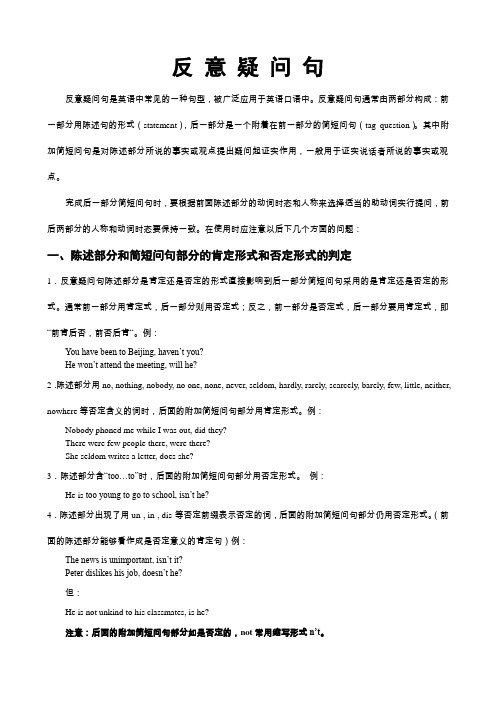
反意疑问句反意疑问句是英语中常见的一种句型,被广泛应用于英语口语中。
反意疑问句通常由两部分构成:前一部分用陈述句的形式(statement),后一部分是一个附着在前一部分的简短问句(tag question)。
其中附加简短问句是对陈述部分所说的事实或观点提出疑问起证实作用,一般用于证实说话者所说的事实或观点。
完成后一部分简短问句时,要根据前面陈述部分的动词时态和人称来选择适当的助动词实行提问,前后两部分的人称和动词时态要保持一致。
在使用时应注意以后下几个方面的问题:一、陈述部分和简短问句部分的肯定形式和否定形式的判定1.反意疑问句陈述部分是肯定还是否定的形式直接影响到后一部分简短问句采用的是肯定还是否定的形式。
通常前一部分用肯定式,后一部分则用否定式;反之,前一部分是否定式,后一部分要用肯定式,即“前肯后否,前否后肯“。
例:You have been to Beijing, haven’t you?He won’t attend the meeting, will he?2.陈述部分用no, nothing, nobody, no one, none, never, seldom, hardly, rarely, scarcely, barely, few, little, neither, nowhere等否定含义的词时,后面的附加简短问句部分用肯定形式。
例:Nobody phoned me while I was out, did they?There were few people there, were there?She seldom writes a letter, does she?3.陈述部分含“too…to”时,后面的附加简短问句部分用否定形式。
例:He is too young to go to school, isn’t he?4.陈述部分出现了用un-, in-, dis-等否定前缀表示否定的词,后面的附加简短问句部分仍用否定形式。
反义疑问句(含解析、例句及详尽用法)

反义疑问句(含解析、例句及详尽用法)-CAL-FENGHAI.-(YICAI)-Company One1反义疑问句一、祈使句的反义疑问句1、肯定祈使句Will you/won’t you2、否定祈使句Will you3、Let的祈使句Let us ...,will you(此处Let us 表示“允许我们...”)Let’s...,shall we (此处Let’s表示“让我们...吧”)Let + 第三人称...,will you二、Must的反义疑问句1、表示“必须” musn’t /needn’tEg. You must go now, needn’t you2、表示“不准”Eg. You musn’t smoke here, must/may you3、表示推测,肯定。
(I’m sure + 从句)Eg. You must be hungry now, aren’t youI’m sure you are hungry now, aren’t youShe must have heard about that, hasn’t sheI’m sure you have heard about that, haven’t youYou must have watched that movie last night, didn’t you(last nigh为具体时间点,所以用一般过去式)三、主语(反义疑问句)+从句主句:I(don’t)think/believe/consider/suppose 或 I’m afraid/sure...后跟从句时,可将从句部分进行反义疑问Eg. I don’t think he will win, will heI think he will win, won’t heShe thinks he will win, doesn’t she(当主句主语不是I时不适用于该用法,此句中的翻译疑问针对的是主句而非从句)四、当句中包含有表示否定意义的副词或不定代词时,反义疑问句用肯定形式Eg. Nothing happened to him, did itIt is unfair, isn’t itHe dislikes watching TV, doesn’t he(该句中含否定意义的是动词而非副词或不定代词,因此不适用于该用法,反义疑问句仍然使用否定形式)五、反义疑问句的回答反义疑问句的回答针对被提问部分的谓语动词,且与回答句前部分的Yes和No 保持一致Eg. A: You haven’t lost the ticket, have youB: D I know it’s hard to get another one at this moment.A. Yes, I haven’tB. No, I haveC. I hope soD. I’m afraid not六、陈述部分的主语与反义疑问句主语保持一致的情况1、OneEg. One can’t be too careful when driving a car, can one/he一个人在开车的时候再怎么小心也不为过。
反义疑问句的种常考特殊用法
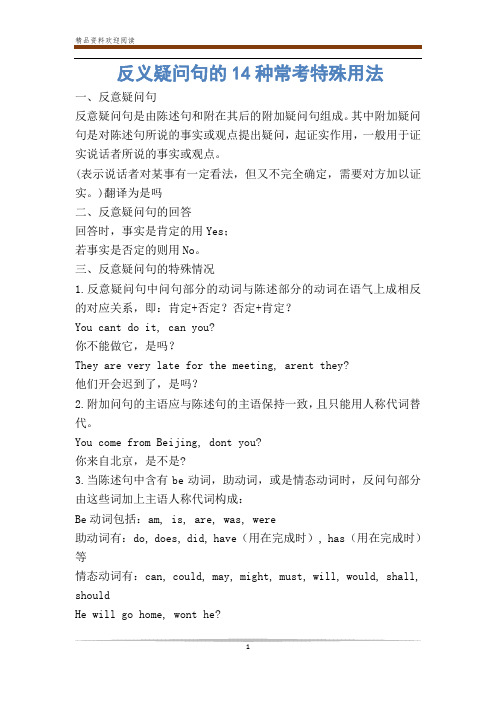
反义疑问句的14种常考特殊用法一、反意疑问句反意疑问句是由陈述句和附在其后的附加疑问句组成。
其中附加疑问句是对陈述句所说的事实或观点提出疑问,起证实作用,一般用于证实说话者所说的事实或观点。
(表示说话者对某事有一定看法,但又不完全确定,需要对方加以证实。
)翻译为是吗二、反意疑问句的回答回答时,事实是肯定的用Yes;若事实是否定的则用No。
三、反意疑问句的特殊情况1.反意疑问句中问句部分的动词与陈述部分的动词在语气上成相反的对应关系,即:肯定+否定?否定+肯定?You cant do it, can you?你不能做它,是吗?They are very late for the meeting, arent they?他们开会迟到了,是吗?2.附加问句的主语应与陈述句的主语保持一致,且只能用人称代词替代。
You come from Beijing, dont you?你来自北京,是不是?3.当陈述句中含有be动词,助动词,或是情态动词时,反问句部分由这些词加上主语人称代词构成:Be动词包括:am, is, are, was, were助动词有:do, does, did, have(用在完成时), has(用在完成时)等情态动词有:can, could, may, might, must, will, would, shall, shouldHe will go home, wont he?他要回家了,是吗?She doesnt like to eat popcorn, does she?她不喜欢吃爆米花,是吗?4.have的不同用法,反义疑问句用不同的动词(1)have 表有时,反义疑问句谓语动词用have/do都行He has a new car, doesnt/hasnt he?(2)have表吃,喝,玩,度过,举办等是,反义疑问句谓语动词用do He has supper at home every day, doesnt he?They had a good time in Beijing, didnt they?(3)have to表不得不,必须时,反义疑问句谓语动词用doKite has to help her mother, doesnt she?(4)had better表最好时,反义疑问句谓语动词用hadWe had better go to school at once, hadnt we?(5)have用在完成时中,反义疑问句谓语动词用haveThey have known the matter, havent they?6_副本.jpg5.(1)反意疑问句的陈述部分带有little, few, never, hardly, seldom,nobody, nothing, no one, none, neither等否定意义的词时,问句部分用肯定式。
英语反义疑问句最全解析

反义疑问句1)“am I”的否定形式是“aren’t I”,而不是“am not I”或“amn’t I”。
例如:I am right, aren’t I?2)everything和nothing作为陈述句的主语时是单数,因此反意疑问句中的主语要用“it”。
注意,nothing作为主语时,反意疑问句中的动词要用肯定形式。
例如:Nothing is wrong, is it?3)陈述句中的主语为everyone, everybody, anyone, nobody或no one时,反意疑问句中的主语用they。
注意,nobody和no one是否定词,因此反意疑问句应该用肯定的。
例如:Nobody knows it, do they?4)如果陈述句部分有no, never, hardly, scarcely, rarely, seldom等词,那么,陈述句本身就是否定的,所以要接一个肯定的反意疑问句。
例如:He has never been there, has he?5)如果陈述句中的动词是“wish”,那么反意疑问句中要用“may”。
例如:I wish to go there with you, may I?6)包括听话人在内时“let’s”的反意疑问句要用“shall we”。
反之,反意疑问句中要用“will you”。
例如:Let’s go, shall we?Let us go, will you?全真模拟试题1. All of the plants now farmed on a large scale were developed from plants ____ wild.A. that once growB. once they growC. they once grewD. once grew2. By the time you graduate, we ____ in Australia for one year.A. will be stayingB. will have stayedC. would have stayedD. have stayed3. He appreciated ____ the chance to deliver his thesis in the annual symposium on Comparative Literature.A. having givenB. to have been givenC. to have givenD. having been given4. The government official can hardly find sufficient grounds ____his arguments in favor of the revision of the tax law.A. on which to baseB. which to be based onC. to base on whichD. on which to be based5. Living in the desert involves a lot of problems, ____water shortage is the worst.A. not to mentionB. of whichC. let aloneD. for what6. Hydrogen is one of the most important element in the universe ____ it provides the building blocks from which the other elementsare produced.A.so thatB. but thatC. provided thatD. in that7. Just as relaxation is an important part of our lives, ____stress.A.so isB. as it isC. and so isD. the same is8. Victor took a bus and headed for home, ____ if his wife would have him back.A. not to knowB. not knownC. not knowingD. not having known9. We can make an exception ____.A. in any case of JohnB. in case of JohnC. in case of John’sD. in the case of John10. When the Cultural Revolution was launched in China, his father ______ college.A. attendedB. had been attendingC. was attendingD. has been attending11. My cat is a fussy eater, but my dog is so ____ that she’ll swallow down anything that is put in front of her.A. indiscriminateB. choosyC. indefiniteD. picky12. “This house is more ____than the federal government!” Mac complained to his parents. “You have rules for everything.”A. systematicB. democraticC. bureaucraticD. public试题答案与解析1. A)【句意】大规模种植的农作物都繁衍于野生植物。
五大句型(三)反意疑问句

五大句型(三):反意疑问句Miss Xia有只狗。
It is a handrail, isn’t it?The circle isn’t moving.The circle isn’t moving,is it?There are three people,aren’t there? There are three people.带有陈述部分带有否定性的词(no, never, none, hardly, seldom, rarely, few, little, nobody, nothing) You have never seen dinosaur eggs,have you?h?John can hardly understand any Chinese,can he?There are people in the classroom are there?There are few people in the classroom,are there?Nobody knows about the news,do they\does he?Nothing is wrong with your watch,is it?否定词缀(im-, un-, dis-)不能视为否定词,陈述部分仍视为肯定形式It is impossible,isn’t it?It is impossible,s t t?He looks unhappy,doesn’t he?The girl dislikes history,doesn’t she?Close the window,will you?Don’t go out will you?Don t go out,will you?Let us stay at home,will you?Let’s stay at home shall we?Let s stay at home ,shall we?一般情况:will you?L t'型h ll?祈使句的反意疑问句Let 's型:shall we?Let us型:will you?1The boy has a good time,doesn’t he?He has eaten 80 candies,hasn’t he? He has to stop doesn’t he?He has to stop,doesn t he?You are asleep aren’tYou are asleep, aren’t you?。
